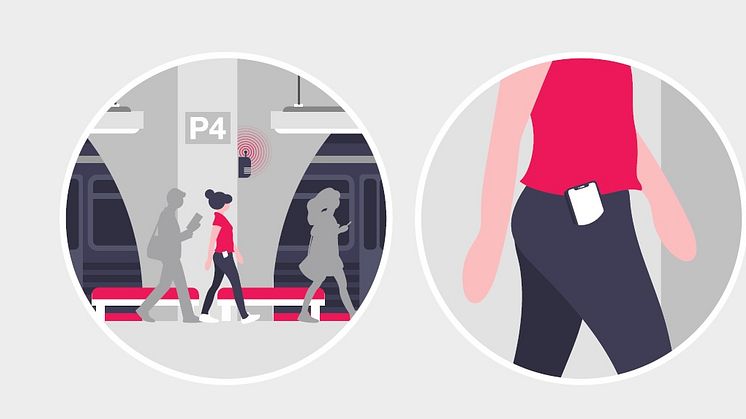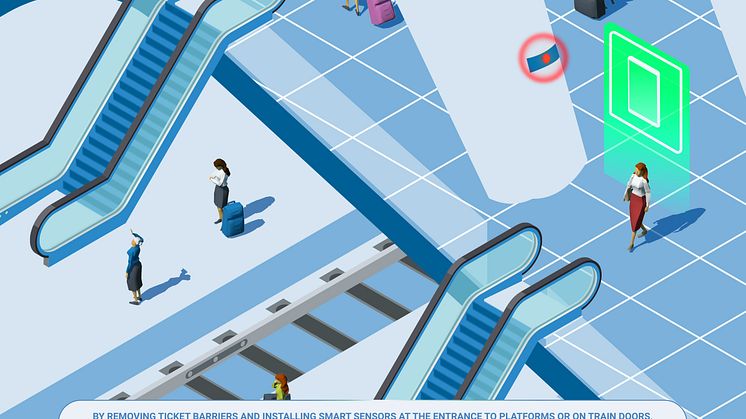
Press release -
Smart ticket overhaul could signal end of the line for station barriers
Ticket barriers could be removed with new technology being developed and trialled by Hitachi Rail.
Prototype technology currently being tested could use sensors on trains to detect an app on passengers’ smartphones as they board.
There would be no need to remove the phone from pockets or bags and no need for station barriers, signalling an end to queues at the barrier or ticket machine.
Passengers will be automatically charged the correct fare, and Hitachi already has proven smart ticketing technology to ensure the passenger will not be overcharged.
The technology will now undergo a rigorous testing programme for Trentino Transporti in Trento, Italy, with Hitachi hoping to bring it to the UK for use on buses, trams and trains.
Karen Boswell, Managing Director, Hitachi Rail, said:
“This technology has the ability to transform public transport in every corner of the country, from rural buses to city centre train stations. The common travelling woes of queues at ticket machines or trying to find the cheapest fare could be solved without even needing to reach for your pocket.
“We are now beginning to test this technology and looking at the possibility of one app working across large stretches of a country. For example, a passenger could use the app to take a bus in their local town and a train elsewhere in the country all in one day.
Ms Boswell added:
“This technology could have potential to make public transport more accessible for all passengers.
“We believe this would also be good news for operators, who can entice more people to use public transport thanks to this simple-to-use payment method.”
How it could work pending trials
Hitachi is exploring different ways of advancing smart ticketing through sensor beacon technology.
For example, one method could be sensors detecting a travel app installed on a smartphone, allowing a passenger to enter a train or bus without presenting either a paper ticket, bankcard or smart card.
The sensors could have potential to detect the smartphone in a passenger’s pocket or bag at both ends of the journey.
Large queues and bottlenecks around ticket barriers could be removed by installing smart sensors at the entrance to platforms or vehicles.
The technology can be applied to all forms of public transport, including buses and trams, allowing faster boarding times.
Hitachi has long pioneered smart ticketing apps which are connected to your payment card. For example, in 2001 Hitachi software launched a card used across Japan (known by tourists in Tokyo as the Penguin card).
Results from the new proof of concept work in Italy will help inform the best ways to apply this technology in the future.
Making public transport simpler, safer and more accessible
The new innovation could work across the UK and help encourage more people to use public transport by:
- -Removing rail ticket machine and fare confusion. Only 25% of users understanding the correct ticket types, Hitachi’s solution could see more people trust taking public transport.
- -Promoting buses as simple to use. As the number of bus journeys fall[1], the seamless approach of walking on a bus without a ticket could encourage more to choose this form of transport over cars.
- -Improving accessibility for passengers with disabilities or carrying young children. Removing the need to show physical tickets on buses gives greater freedom to passengers with restricted movements.
Japanese technology shaping UK transport
As well as building the world famous Japanese bullet-trains, Hitachi has significant expertise in smart ticketing technology. Hitachi’s smart travel cards in Japan are used over 50 million times a day across 100 different modes of transport, and can even by used on tourist attractions and in shops.
The company has already invested significantly in the UK by establishing a £100million state-of-the-art train factory in the North East of England. By 2022, the company will have 286 trains running in the UK, each boasting advanced smart technology to improve performance and passenger experience.
[1] https://assets.publishing.service.gov.uk/government/uploads/system/uploads/attachment_data/file/774565/annual-bus-statistics-year-ending-mar-2018.pdf
Topics
Categories
Hitachi Rail is a global transport specialist with over 100 years of experience building pioneering trains, offering quality maintenance and developing innovative new technology. As a leader in rail we’re improving transport for passengers, connecting communities and helping to boost the UK’s economy.
Having delivered the hugely popular Javelin HS1 fleet in advance of the 2012 London Games, Hitachi is delivering major orders for new trains, with 286 due to be in service by the end of 2021. Our purpose-built factory in County Durham is delivering 122 new high speed trains as part of the UK Government’s £5.7bn Intercity Express Programme and a fleet of 70 regional trains for Scotland. With a proud reputation for innovation, Hitachi is at the forefront of using new digital technology to enhance passenger experience and enrich Britain’s railway’s heritage. Hitachi rail is growing rapidly, employing over 3,000 people and soon to be operational at 15 locations across the UK.
For more information about the company, please visit www.hitachirail.com

